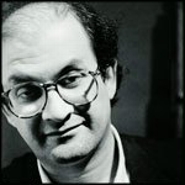
Author Salman Rushdie will give Hamilton College's Tolles Lecture on Wednesday, April 13, at 7 p.m. in Wellin Hall, Schambach Center for the Performing Arts. His lecture, "Step Across This Line: An Evening with Salman Rushdie," is free and open to the public and will be interpreted in sign language. It will be followed by a book signing in Cafe Opus.
The Tolles Lecture was established in 1991 by members of the class of 1951 in memory of Winton Tolles, class of 1928 and dean of the college from 1947 to 1972. It brings to the campus distinguished speakers in the fields of literature, journalism and theater to lecture and meet with students.
Rushdie— one of the best-known living writers of the current age, according to critic C. J. S. Wallia — has increasingly assumed the role of a public intellectual. In his lectures he explores many of the themes covered in his books: freedom of expression, religion and its relationship to popular culture and modern society, and the role of the artist in society. Rushdie has spoken at Yale, Harvard and Oxford, among other educational institutions, and is an honorary professor of humanities at the Massachusetts Institute of Technology. He has a reputation as a lively, witty, thought-provoking speaker.
Born in 1947, Rushdie grew up in Bombay, India, and graduated from King's College, Cambridge, in England. Apart from a brief period in Pakistan, where his parents moved in the '60s, he spent most of his adult life in England before moving to Manhattan around the turn of the millennium. He has published eight novels, a collection of short stories, and several works of nonfiction. His first major novel, Midnight's Children, won the Booker Prize in 1981, and was awarded the Booker of Bookers as the best novel in the history of the prize. Among the other literary awards he has won are the Whitbread Prize for Best Novel, the French Prix du Meilleur Livre Étranger, the Budapest Grand Prize for Literature, the Mantova Prize in Italy, the Austrian State Prize for European Literature and the London International Writers' Award.
Rushdie's magic realism, comic imagination, linguistic pyrotechnics and postmodern questioning of the nature of truth have influenced novelists worldwide. In The Satanic Verses and elsewhere he addresses the migrant condition. Besides writing fiction set in India and Pakistan, with an abiding concern for the nation as an imagined community, Rushdie has written of the global culture of pop music (The Ground Beneath Her Feet). His latest novel, Fury, is set in Manhattan.
Rushdie's most recent book is Step Across This Line: Collected Non-fiction, 1992-2002. Among other topics, the pieces in this collection explore the reaction of the media, various governments and the writer himself to what he calls the "unfunny Valentine" he received on February 14, 1989, from Iran's Ayatollah Khomeini: the fatwa calling for his death on the grounds of blasphemy against Islam in his novel The Satanic Verses. As a result of the fatwa, Rushdie spent a decade of his life in hiding, protected by British security forces. The government of Iran withdrew its support for the fatwa in 1998.
Posted April 11, 2005
